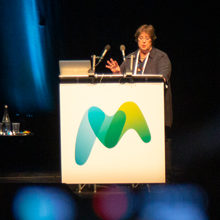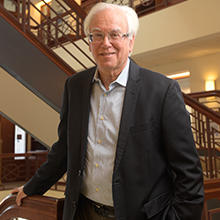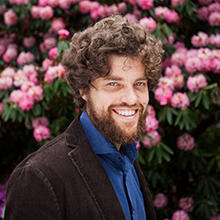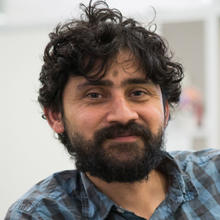Prize Lecture winners 2020
04 November 2019

The Microbiology Society is pleased to announce the winners of our 2020 Prizes, which will be awarded at our Annual Conference, to be held from 30 March–3 April at the EICC Edinburgh, UK. The winners will also present their lectures at the Annual Conference.
The Microbiology Society’s Prizes recognise excellence and are awarded to those making significant contributions in the field of microbiology, based on nominations received from the membership. 2020 marks the 75th anniversary of the founding of the Society and the microbiology community is invited to attend our Fleming Showcase event, Annual Conference and join a host of other activities in recognition of the impact of microbiologists past, present and future.
Prize Medal

The 2020 Microbiology Society Prize Medal is awarded to Professor Martin Blaser, from Rutgers University, New Jersey. Professor Blaser is best known for his work on Campylobacter jejuni and Helicobacter pylori as human pathogens. He helped establish that H. pylori was an ancient resident of the human stomach but surprisingly was disappearing from contemporary populations. His further studies showed that in addition to its pathogenic properties causing peptic ulcers and stomach cancer, H. pylori was a symbiont as well, protecting the oesophagus from inflammation and neoplasia and protecting the lung from asthma. He reasoned that if one important commensal was disappearing from humans that there would be others, and that these changes would lead to clinical consequences. Now more than 20 years later, the evidence is becoming overwhelming that he was correct.
He said of the award; “I am most honoured to receive the Prize Medal, and humbled to join the illustrious list of recipients. Receiving the Prize also means that the theories and experimental work that I have been working on are beginning to be recognised in the wider world of ideas as being true and having utility. For all of these reasons, I am grateful to the Society.”
The Prize Medal is awarded to an outstanding microbiologist who is a global leader in their field and whose work has had a far-reaching impact beyond the discipline of microbiology. The recipient is awarded an engraved medal and £1,000 at the Society’s Annual Conference.
Marjory Stephenson Prize

The 2020 Marjory Stephenson Prize is awarded to Professor Julian Parkhill FRS, from the University of Cambridge. Professor Parkhill is known for his research on bacterial genomes, which he has worked on since the very earliest days of genomics. Initially analysing reference genomes for many important human and animal pathogens, his group moved on to comparative genomics and subsequently large-scale population genomics, as new technologies developed. He has primarily focused his analysis on the evolution of bacterial pathogens; their origin, transmission and adaptation to selective pressure. His current work uses large-scale population genomics to identify the global origin and routes of spread of human and animal pathogens. His group has addressed adaption to the host, to antibiotics and to vaccine pressure, most recently developing new bacterial genome-wide association approaches to identify genetic determinants responsible for this adaptation and collaborating on the implementation of genomics in clinical microbiology.
He said of the award; “I am delighted and honoured to receive this prize from the Microbiology Society. Our work is fundamentally collaborative, and during my career I have been privileged to work with some of the finest microbiologists in the world, many of them members of this Society. Nothing I have done would have been possible without their help, and I am very grateful to them all. Since my PhD, coming to the Society’s meetings has been an essential part of my education and my research, and I am sure this will continue.”
The Marjory Stephenson Prize is named after Society founding member and former President Marjory Stephenson. The Prize is awarded to an individual who has made exceptional contributions to the discipline of microbiology. The recipient is awarded £1,000.
Fleming Prize

The 2020 Fleming Prize is awarded to Professor Edze Westra from the University of Exeter. He known for his work on the molecular mechanisms and evolutionary ecology of CRISPR-Cas systems.
Professor Westra studies both molecular aspects of CRISPR-Cas immune systems of bacteria and their evolutionary ecology, in order to understand how these systems work, when they are important and what their consequences are. His early work focused on the mechanism of parasite detection and destruction through the combined action of an immune surveillance complex known as Cascade and a nuclease known as Cas3. His further research has explored how the ecological context determines whether bacteria employ their CRISPR-Cas immune system to resist phage infections or whether they evolve resistance by mutation of the phage receptor on the cell surface. More recently Professor Westra has developed a research program focused on the evolutionary ecology of the wider range of mechanisms encoded by bacteria to resist bacteriophage infections.
He said of the award: “I am absolutely delighted to have been selected for the 2020 Fleming Prize, the oldest accolade of the Microbiology Society. It is a huge and unexpected honour to be recognised in this way for my work on the molecular mechanisms and evolutionary ecology of CRISPR-Cas systems. I would like to thank the Microbiology Society for this prestigious award and the University of Exeter for their support during my research trajectory. I also want to acknowledge my talented lab members and collaborators whose dedication, persistence and creativity have formed the foundation for this award.”
The Fleming Prize is named after Sir Alexander Fleming, founder and first President of the Microbiology Society, then named the Society for General Microbiology (1945–1947) and is awarded to an early career researcher who has achieved an outstanding research record. The recipient is awarded £1,000.
Peter Wildy Prize

The 2020 Peter Wildy Prize is awarded to Professor Graham Hatfull from the University of Pittsburgh. His research focuses on the molecular genetics of the mycobacteria and their bacteriophages, and their use for educational advancement. These studies take advantage of the intimacy of phage-host interactions to gain insights into the genetics and physiology of Mycobacterium tuberculosis, the causative agent of human tuberculosis (TB).
Professor Hatfull is a world leading expert in collecting phages and learning what they do, including developing understanding of phage therapy, where viruses are used to infect and kill bacteria.
His research focuses on the molecular genetics of the mycobacteria and their bacteriophages, and their use for educational advancement. These studies take advantage of the intimacy of phage-host interactions to gain insights into the genetics and physiology of Mycobacterium tuberculosis, the causative agent of human TB. Through integrated research-education programs such as the PHIRE and SEA-PHAGES programmes, a large collection of completely sequenced mycobacteriophage genomes provides insights into viral diversity and evolution and represents a rich toolbox of new approaches for understanding M. tuberculosis and other mycobacterial diseases.
Professor Hatfull is a fellow of the American Academy of Microbiology, a fellow of the American Association for the Advancement of Science, and a teaching fellow of the National Academy of Science.
He said of the award: “I am so delighted to receive the Peter Wildy Prize. It is a wonderful recognition of innovations in science education. Early-career undergraduates not only can but should engage in authentic research, advancing a key research area, enhancing student persistence in science, and promoting an inclusive scientific community. Much thanks to all of my colleagues who have successfully advanced these efforts.”
The Peter Wildy Prize is named after distinguished virologist and much-loved teacher Peter Wildy, who was President of the Society from 1978 to 1981 and is awarded for outstanding contributions to microbiology education or the communication of microbiology to the public. The recipient is awarded £1,000.
Unilever Colworth Prize

The 2020 Unilever Colworth Prize is awarded to Professor Manu Prakash from Stanford University. Dr Prakash is best known for his pioneering work in inventing high-tech tools using inexpensive materials – an endeavour he calls ‘frugal science’. His inventions may have been designed to address complicated problems, but their low cost and simple designs make them accessible to everyone. Born in Meerut, India, Manu earned a BTech in computer science and engineering from the Indian Institute of Technology Kanpur and a PhD in applied physics from Massachusetts Institute of Technology. He is best known for his Foldscope and Paperfuge. He received the MacArthur Fellowship in September 2016.
He said of the award; “I am truly humbled and inspired to be accepting this award. Our work to share scientific tools and democratize access to science is only possible due to the passionate foldscope users that bring frugal science tools to communities far and wide. I also want to acknowledge the tireless efforts of every one in the foldscope team, and all my former and current students who make science fun every day.”
The Microbiology Society’s Annual Conference 2020 will be held at the EICC Edinburgh, UK, from Monday 30 March–Friday 3 April. In recognition of the Society’s 75th anniversary, it will open with the Fleming Showcase, a day showcasing the ethos of the Fleming Prize, awarded to recognise outstanding early career researchers. The Showcase offers an opportunity to demonstrate the legacy of past Fleming Prize winners and to explore the impact of both established and up-and-coming scientists in addressing important global challenges. The Showcase will be followed by Annual Conference – to view the rest of the extensive programme and to register, please visit the event’s website. To find out more about our Prize Lectures, visit the Prize Lectures page.
